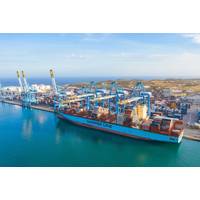Russian Syzran Oil Refinery Halted by Ukraine Drone Attack

Russia's Syzran oil refinery on the Volga River halted oil processing on December 5 after being damaged by a Ukrainian drone attack, two industry sources said on Tuesday.Ukraine and Russia have been attacking each other's energy facilities as peace talks have failed to progress.The Ukrainian military said on Friday that it had carried out long-range strikes overnight on an oil refinery in the Russian city of Syzran and the Temryuk port in the Krasnodar region.The sources said the drones hit the plant's CDU-6 crude distillation unit, which is primary equipment that was also targeted by dro
Mexico's Pemex refines more and pumps less at home, according to data from October
Data shows that the Mexican state energy company Pemex refined more crude oil at home in October, but pumped less crude oil. Pemex attributes the continued decline in crude production, currently averaging 1.36 million barrels per day (bpd), down 6% on an annual basis, to a lack of discoveries relevant and the natural decline of key fields. Olmeca, the refinery located in Dos Bocas port, processed 191,657 barrels per day, helping to boost the refinery's output by 43%. It refined nothing in October of last year.
Pemex Crude Oil Production Falls 5.6% in September

Mexico's state energy company Pemex produced 5.6% less crude oil and condensate year-on-year in September, an average 1.65 million barrels per day (bpd), according to data it released late on Tuesday.The heavily-indebted driller has struggled to boost production, despite cash injections and tax relief since the previous administration, as many fields are being depleted and new discoveries have not managed to make up for this.Crude oil processing at the seven local refineries increased 7.7% year-on-year in September to 949,772 bpd but remained almost 10% below August levels.The seven refin
Mexico's Pemex production of oil fell 5.6% in September, as gasoline and diesel production rose
According to the data released by Pemex late Tuesday, Mexico's state-owned energy company Pemex has produced 5.6% less crude and condensate in September compared to last year. This equates to an average of 1.65 million barrels a day (bpd). The driller, who is heavily indebted, has been unable to increase production despite the cash injections and tax reductions since the previous administration. Many fields are depleting and new discoveries cannot compensate for this. The seven local refineries processed crude oil at 949,772 barrels per day in September.
Sources say that the Astrakhan Gas Plant in Russia has ceased operations following a drone attack.
Three industry sources have confirmed that the Astrakhan Gas Processing Plant, owned by energy giant Gazprom in Russia, stopped producing motor fuel after an attack by drones caused a fire on September 22, according to three sources. The fire was said to have engulfed an entire condensate unit that had a production capacity of three million metric tonnes per year. It produces diesel and gasoline. The plant near the Caspian sea, about 1,675 km from the Ukrainian border could only resume production within a few weeks or months. Gazprom didn't immediately respond to a comment request.
Bangladesh increases its power purchase from India and reduces its fuel oil consumption as the demand for electricity rises
Industry officials and analysts report that Bangladesh is increasing power imports from India as well as the output of fuel oil-fired plants to try and meet its rising electricity demand. The country faces a shortage of gas and maintenance costs for coal power plants. Government data revealed that power imports from eastern India's Adani Power coal-fired plants rose by 70% during the seven-month period ending in July, and they helped to meet most of the growing demand. The country's electricity demand was largely met by natural gas in the decade ending in 2020.
Data shows that Pemex crude exports rose in July, while refinery production dropped.

According to the most recent data from the company, Pemex, the Mexican state oil company, reported that crude oil exports rose by 31% in July, compared to last month. However, the company's refining production fell slightly in the same time period. Pemex exports and refinery output are closely monitored as the government attempts to reduce motor oil imports and prioritize domestic processing in order to achieve energy independence. Exports in July reached 600,669 barrels a day (bpd), up 31% compared to June when they hit a multiyear low.
Iraq Navy Detains Oil Tanker in Smuggling Crackdown

Iraq's navy has detained a Liberian-flagged oil tanker in its territorial waters as part of a crackdown on fuel smuggling at sea, sources with the navy and oil and transport ministries said on Friday.Smuggling is common in Gulf waters, where heavily subsidised fuel from some countries is sold on the black market to buyers across the region, though it has been relatively rare until recently for Iraqi authorities to seize ships.The vessel - identified by both the authorities and shipping sources as the Liliana tanker - was carrying 93…
US Gulf Coast Fuel Oil Imports Drops As Heavier Crude Is Preferred

Fuel oil imports into the refinery hub on the U.S. Gulf Coast hit a record low in June as tighter global supplies prompted refiners to run more heavy, sour crude.When refineries run a heavier, sourer crude slate, they produce more heavy residue, which is either processed in a secondary unit to produce higher value products like gasoline or diesel.Gulf Coast-bound fuel oil imports hit a record low at 213,000 barrels per day in June, down from 233,000 bpd on the month, according to ship tracker…
Israel resumes limited gas exports despite ongoing conflict; Egypt still waiting

Israel resumed exports of natural gas from its surplus, according to the Energy Ministry on Thursday. This comes nearly a full week after Israel and Iran engaged in an aerial battle. According to a source in the energy ministry, most of the gas exported is flowing into Jordan and "tiny quantities" have reached Egypt only this week. Egyptian fertilizer producers who had to stop operations because of the disruption in gas supply have said they still haven't received any gas, but are expecting it to return next week.
Egypt stops fertilizer production after Israeli gas shortages increase energy strain
Industry sources report that Egyptian fertilizer producers had to stop operations Friday because of a decline in natural gas imported from Israel. After Israel's attacks on Iranian nuclear and missile facilities, they said that major Israeli gasfields had halted operations. Egypt's Petroleum Ministry announced that an emergency plan had been implemented to prioritise gas allocations and cut supply to certain industries. The ministry reported that power stations are using fuel oil at maximum levels and switching to diesel is being done to protect the stability and load of the gas grid.
Egypt In Talks to Buy LNG Cargoes Amidst Energy Crunch

Egypt is in talks with energy firms and trading houses to buy 40-60 cargoes of liquefied natural gas (LNG) amid a worsening energy crunch ahead of peak summer demand, three sources aware of the matter told Reuters.The country faces spending up to $3 billion at current prices to secure the LNG, squeezing government coffers already under strain to keep the lights on amid falling gas production and a cost of living crisis.President Abdel Fattah al-Sisi on Wednesday directed the government to "preemptively take whatever needs necessary to ensure stable electricity flow…
Sources say Egypt is in talks with suppliers to purchase 40-60 LNG cargoes during this year due to the energy crisis.

Three sources familiar with the matter said that Egypt is in discussions with international energy companies and trading houses about buying 40-60 cargoes (LNG) of liquefied gas to ensure emergency fuel imports ahead of summer peak demand amid an worsening energy crisis. According to the latest available data from the Joint Organisations Data Initiative, Egypt's gas production fell by 39% in February to its lowest level in 9 years. It was 3.3 billion cubic meters. The most populous Arab nation has been a net gas importer since early 2024.
Egypt's fertiliser manufacturers cut production as gas supplies are reduced

Two of Egypt's biggest fertiliser producers announced on Wednesday that they received an official notification about a two week reduction in the natural gas supply at their plants. This triggered a drop in production. Both Abu Qir Fertilizers and Chemical Industries and Misr Fertilizers Production stated in their stock exchange statements that the expected production to fall by 30% over the period. Egypt is facing a growing gas shortage ahead of summer peak season. The government is scrambling to secure more gas and fuel oil to meet the surge in demand.
WGC-QatarEnergy CEO: Chemical industry is growing rapidly, says WGC

QatarEnergy, according to its chief executive Saad Al-Kaabi, plans to double its global capacity for plastics and raw materials as the company sees a big growth in chemical industries. He told the World Gas Conference that the state-owned company anticipates starting production on its U.S. Ethane Cracker Project in the first quarter 2027. According to the website of the U.S. firm, this joint venture project with Chevron Phillips Chemical was expected to start operations in 2026.
World's First Commercial-Scale E-Methanol Plant Opens in Denmark

The world's first commercial-scale e-methanol plant began operations in Denmark on Tuesday, with shipping giant Maersk set to buy part of the production as a low-emission fuel for its fleet of container ships.The shipping sector is under pressure to find new sources of fuel after a majority of countries gave their backing to measures to help meet the International Maritime Organization's targets towards eliminating carbon emissions by 2050.So far zero-emission shipping fuels…
Afreximbank, an oil and gas investor, has allocated $3 billion to support local refineries
A senior executive revealed that the African Export-Import Bank, (Afreximbank), which is a major investor in oil-and-gas projects, had set aside $3 billion for financing the purchase of refined goods within Africa, as part of plans to increase refining capacities. Bank and analysts say that Africa exports 80% of its crude oils and 45% of its natural gas, making it heavily dependent on imported refined products. The energy landscape in sub-Saharan Africa is characterized by aging refineries and a lack of storage infrastructure.
TotalEnergies warns that indirect emissions may increase as the company aims to sell gas

TotalEnergies, a French energy company, said in its sustainability report on Thursday that plans to sell more gas in the coming years would increase indirect CO2 emissions. TotalEnergies said that global emissions will also fall as a result of its clients moving away from dirty fuels. In 2024, the French oil giant emitted 376 millions metric tons CO2-equivalent. Of this, 342 million tons was indirect emissions so-called Scope 3, which comes from clients burning fuels purchased. This is a slight decrease from the 386 tons CO2-equivalent that was produced in 2023.
Nigeria’s Refining Revolution is Reshaping West Africa’s Energy Landscape

The launch of the Dangote Refinery near the Port of Lagos presents an exciting opportunity to transform the energy and shipping markets in West Africa. And it stands to boost Nigeria’s role as an influential player in the global oil industry, fostering economic growth and regional development.Nigeria’s standing in the global energy landscape is getting a boost with domestic refining capacity expanding in 2025. The Dangote Refinery near Lagos presents a transformative opportunity…
Exports of crude oil by Mexico's Pemex rose 33% from January to February

The crude oil exports of the Mexican state energy company Pemex increased 33% from January to February, recovering from the drop in the previous month but still being down 25% when compared with February 2024. Pemex published data late Tuesday showing that crude exports reached 709,793 barrels a day (bpd) in February. About 60%, or 428 357 bpd of these exports went to the United States. The majority of this was the Maya heavy crude blend. Crude exports fell by 44% in January compared to the same period last year, reaching their lowest level for decades.